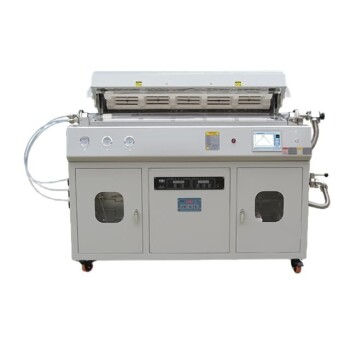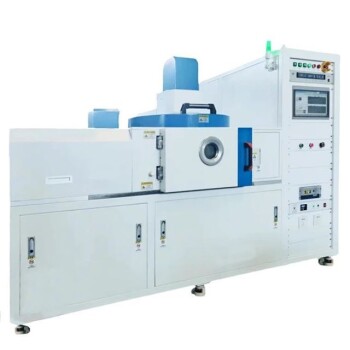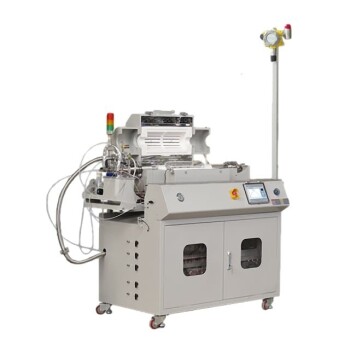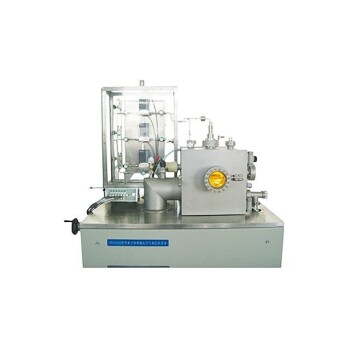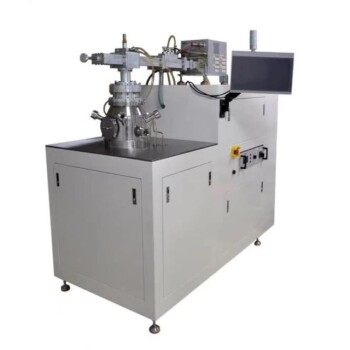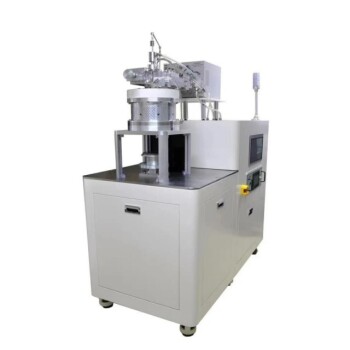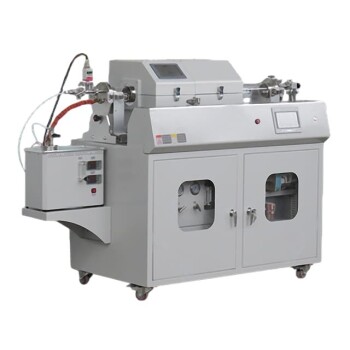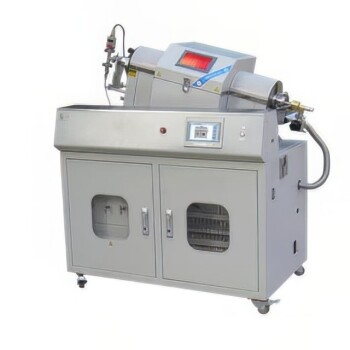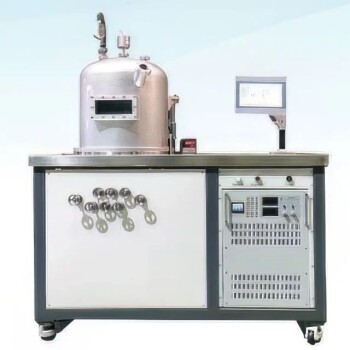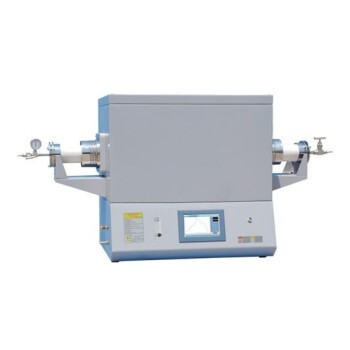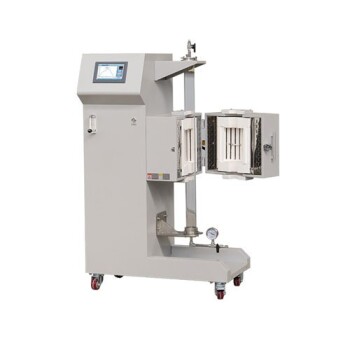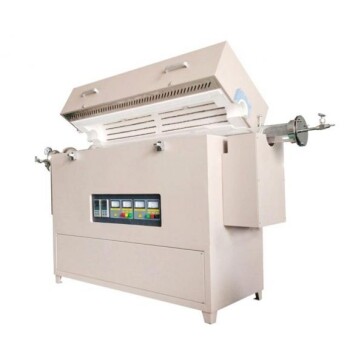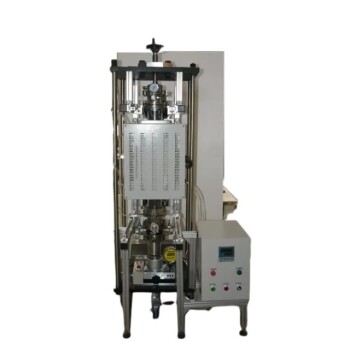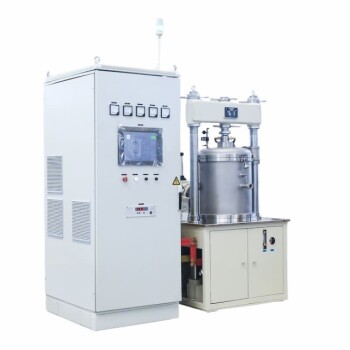At its core, Chemical Vapor Deposition (CVD) is an indispensable technology in industries that rely on modifying a material's surface to achieve radically new properties. It is most valuable in the semiconductor, aerospace, and optical industries, where its ability to create ultra-thin, high-performance films enables the function of everything from microchips to jet engines.
The true value of CVD is not just in applying a coating, but in building a functional material, often just a few atoms thick, directly onto a surface. This process allows engineers to grant properties—like electrical conductivity, extreme hardness, or specific optical behaviors—to materials that otherwise lack them.
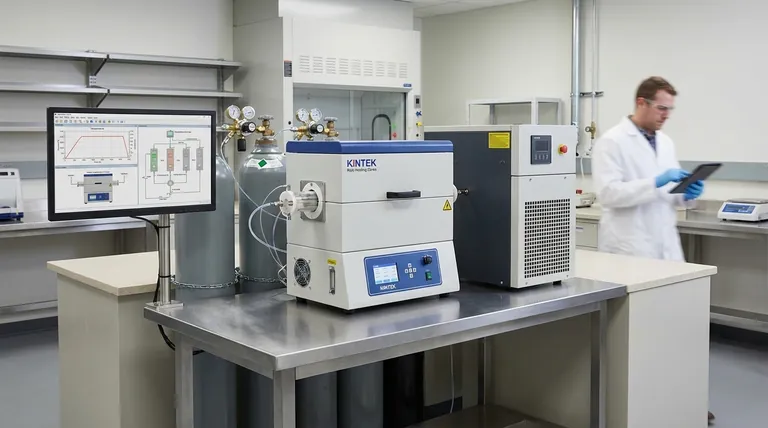
Powering the Digital World: CVD in Semiconductors
The modern electronics industry would not exist without CVD. It is the foundational process used to build the complex, multi-layered structures that form integrated circuits, or microchips.
Building the Brain of a Chip
CVD is used to deposit hyper-pure, crystalline layers of silicon onto a wafer. This high-quality silicon forms the semiconducting base upon which all other circuit components are built.
Insulating and Connecting Components
To create a functional circuit, you need to isolate millions of microscopic transistors from each other. CVD deposits incredibly thin, uniform layers of insulating materials, such as silicon dioxide, to prevent electrical "cross-talk" and ensure the chip functions correctly.
Enabling Next-Generation Materials
The process is also critical for manufacturing advanced displays and future electronics. For example, large, single-atom-thick sheets of graphene for flexible TV displays or advanced water filtration systems are grown using specialized CVD techniques.
Surviving the Extremes: CVD in Aerospace and Manufacturing
In aerospace and high-performance manufacturing, components must withstand incredible stress, heat, and corrosion. CVD is used to apply protective coatings that dramatically extend the lifespan and performance of critical parts.
Creating Thermal Barrier Coatings
Jet engine turbine blades operate at temperatures that would melt the underlying metal alloy. CVD applies a thin ceramic coating that acts as a thermal barrier, reflecting heat and allowing the engine to run hotter, more efficiently, and for longer.
Enhancing Wear Resistance
Cutting tools, bearings, and other components subject to intense friction are coated using CVD. A layer of a super-hard material like titanium nitride can make a standard steel tool many times more durable, allowing for faster and more precise manufacturing.
Preventing Corrosion
Components exposed to harsh environments, from marine equipment to chemical reactors, are protected with dense, non-porous coatings applied via CVD. These layers create an impenetrable barrier against corrosive agents.
Manipulating Light and Energy: CVD in Optics and Solar
The ability of CVD to control a film's thickness and composition with atomic precision makes it ideal for applications that involve manipulating light.
Engineering Optical Films
Everything from anti-reflective coatings on eyeglasses and camera lenses to highly reflective films on specialized mirrors is created with CVD. By layering different materials, engineers can precisely control which wavelengths of light are reflected, absorbed, or transmitted.
Driving Solar Panel Efficiency
CVD is a key process in manufacturing photovoltaic cells. It is used to deposit the thin silicon films that capture sunlight and convert it into electricity. The uniformity and purity achieved with CVD are critical for maximizing a solar panel's efficiency.
Understanding the Trade-offs: The Limits of CVD
While powerful, CVD is not a universal solution. Its effectiveness is governed by a set of technical and economic trade-offs that are critical to understand.
High Temperatures and Substrate Limitations
Traditional CVD processes often require very high temperatures (over 600°C) to drive the necessary chemical reactions. This makes it unsuitable for coating temperature-sensitive materials like plastics or certain metal alloys that could be damaged by the heat.
Chemical Complexity and Safety
CVD relies on volatile and sometimes hazardous precursor gases. Managing these chemicals requires sophisticated safety systems, exhaust treatment, and precise process control, adding complexity and cost to the operation.
Cost and Process Speed
Compared to other coating methods like Physical Vapor Deposition (PVD), CVD can be a slower and more capital-intensive process. The selection between them often depends on the required film quality versus the desired production volume and cost.
Making the Right Choice for Your Goal
Selecting CVD is about matching its unique capabilities to a specific industrial need. Your primary objective will determine if it is the right approach.
- If your primary focus is ultimate purity and intricate layering for electronics: CVD is the industry standard for fabricating the complex, multi-material stacks required for modern microchips.
- If your primary focus is extreme durability and thermal protection: CVD provides dense, highly adherent coatings essential for components in aerospace and high-wear manufacturing applications.
- If your primary focus is precise control over optical or electrical properties: CVD enables the creation of thin films with specific functionalities for advanced lenses, sensors, and solar cells.
Ultimately, CVD is the technology of choice when you need to fundamentally transform a surface, not just cover it.
Summary Table:
| Industry | Key CVD Applications | Benefits |
|---|---|---|
| Semiconductor | Silicon deposition, insulating layers, graphene growth | Enables microchip fabrication, high purity, and advanced electronics |
| Aerospace | Thermal barrier coatings, wear-resistant layers | Extends component life, improves heat resistance and durability |
| Optics | Anti-reflective films, solar cell layers | Enhances light control, increases efficiency in lenses and panels |
Ready to elevate your lab's capabilities with tailored high-temperature furnace solutions? KINTEK leverages exceptional R&D and in-house manufacturing to provide advanced furnaces like Muffle, Tube, Rotary, Vacuum & Atmosphere, and CVD/PECVD Systems. Our deep customization ensures precise alignment with your unique experimental needs in industries such as semiconductors, aerospace, and optics—boosting efficiency, durability, and innovation. Contact us today to discuss how we can support your projects!
Visual Guide

Related Products
- Multi Heating Zones CVD Tube Furnace Machine for Chemical Vapor Deposition Equipment
- RF PECVD System Radio Frequency Plasma Enhanced Chemical Vapor Deposition
- Custom Made Versatile CVD Tube Furnace Chemical Vapor Deposition CVD Equipment Machine
- Inclined Rotary Plasma Enhanced Chemical Deposition PECVD Tube Furnace Machine
- Cylindrical Resonator MPCVD Machine System for Lab Diamond Growth
People Also Ask
- What are the key features of CVD tube furnaces for 2D material processing? Unlock Precision Synthesis for Superior Materials
- What are 2D heterostructures and how are they created using CVD tube furnaces? Unlock Atomic-Scale Material Engineering
- How does a CVD tube furnace achieve high purity in gate media preparation? Master Precision Control for Flawless Films
- What are the operational benefits of using a CVD Tube Furnace? Enhance Precision and Efficiency in Your Lab
- What are the advantages of CVD tube furnace sintering systems? Achieve Superior Material Control and Purity
